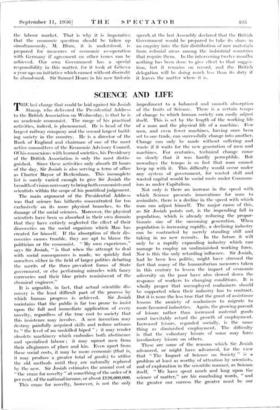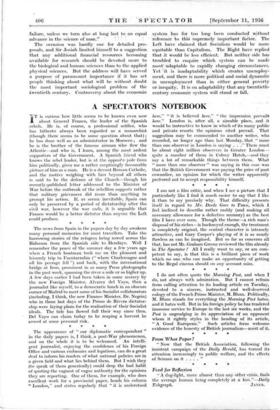SCIENCE AND LIFE
THE last charge that could be laid against Sir Josiah Stamp, who delivered the Presidential Address to the British Association on Wednesday, is that he is an academic economist. The range of his practical activities, indeed, is phenomenal. He is head of the largest railway company and the second largest build- ing society in the country. He is a director of the Bank of England and chairman of one of the most active committees of the Economic Advisory Council, Of his connexions with learned societies, his Presidency of the British Association is only the most distin- guished. Since these activities only absorb 23 hours of the day, Sir Josiah is also serving a term of office as Charter Mayor of Beckenham. This incomplete list is surely varied enough to give Sir Josiah the breadth of vision necessary to bring both economists and scientists within the scope of his pontifical judgement.
The main argument of the Presidential Address was that science has hitherto concentrated far too exclusively on its more physical branches, to the damage of the social sciences. Moreover, the physical scientists have been so absorbed in their own domain that they have entirely neglected the effect of their discoveries on the social organism which Man has created for himself. If the absorption of their dis-: coveries causes trouble, they are apt to blame the politician or the economist. " My own experience," says Sir Josiah, " is that when the attempt to deal with social consequences is made, we quickly find ourselves either in the field of larger politics debating the merits of the three prevalent forms of State government, or else performing miracles with fancy currencies and their blue prints reminiscent of the chemical engineer."
It is arguable, in fact, that actual scientific dis- covery is. the least difficult part of the process by= which human progress is achieved. Sir Josiah maintains that the public is far too pione to insist upon . the full and immediate application of every novelty, regardless of the true cost to society that this insistence may involve. A new invention may destroy painfully acquired skills and reduce artisans to " the level of an unskilled biped " ; it may render obsolete machinery which embodies both abstinence and specialised labour ; it may uproot men from their allegiances of place and kin. Even apart frOm these social costs, it may be more economic (that is; it may produce a,eater total of goods) to utilise ,u the old methods until they, are 'naturally replaced by the new. Sir Josiah estimates the annual cost of " the craze for novelty" at something of the order-of 3 per cent. of the national income, or about £120,000,000. This craze for novelty, however, is not the only impediment to a balanced and smooth absorption of the fruits of Science. There is a certain tempo of change to 'which human society can easily adjust itself. This is set by the length of the working life of a man and the physical life of a machine. Few men, and even fewer machines, having once been set to one trade, can successfully change into another. Change can only be made without suffering and waste if it waits for the new generation of men and machines. For centuries, technical change came so slowly that it was hardly perceptible. But nowadays the tempo is so fast that man cannot keep up with it. This difficulty would occur under any system of government, for wasted skill and wasted capital would be social costs under Commun- ism as under Capitalism.
Not only is there an increase in the speed with which Science presents innovations for man to assimilate, there is -a decline in the -speed with which man can adjust himself. The major cause of this, as Sir Josiah points out, is the impending fall in population, which is already reducing the propor tionate size of the oncoming generation. When population is increasing rapidly, a declining industry can be contracted by merely standing still and taking in no new recruits. In the future it will only be a rapidly expanding industry which can manage to employ an undiminished working force. Nor is this the only retarding influence. Sir Josiah, had he been less politic, might have stressed the fact that many of the humanitarian measures taken in this century to lessen the impact of economic adversity on the poor have also slowed down the response of workers to changing conditions. It is wholly proper that unemployed coalminers should be supported when their industry has to contract. But it is none the less true that the grant of assistance lessens the anxiety of coalminers to migrate to more favoured industries. Again, the growing pursuit of leisure rather than increased material goods must inevitably retard the growth of employment.
Increased leisure, regarded socially, is the same thing as diminished employment. The difficulty is that the voluntary leisure of some may force. involuntary leisure on others.
These are some of the reasons which Sir Josiah advanced, or might have advanced, for the view that " The Impact of Science on Society " is a_ problem at least as worthy of attention by scientists,. and of exploration in the scientific manner, as Science itself, " We have spent much and long upon the science of matter," are his concluding words, " and the greater our success the greater must be our failure, unless we turn also at long last to an equal advance in the science of man." ' The occasion was hardly one for detailed pro- posals, and Sir Josiah limited himself to a suggestion that any additional financial resources becoming available for research should be devoted more to the biological and human sciences than to the applied physical sciences. But the address will have served a purpose of paramount importance if it has set people thinking about what will be without doubt the most important sociological problem of the twentieth century. Controversy about the economic system has for too long been conducted without 'reference to thii suprem- ely impOttanf faetor. The Left have claimed that Socialism would be more equitable than Capitalism. The Right have replied that it would be less efficient. But neither side has troubled to enquire which system can be made mostn 'adaptable to rapidly changing circumstances. Yet lit is inadaptability which creates unemploy- ment, and there is more political and social dynamite in unemployment than in either general poverty or inequity. It is on adaptability that any twentieth- century economic system will stand or fall.













































 Previous page
Previous page